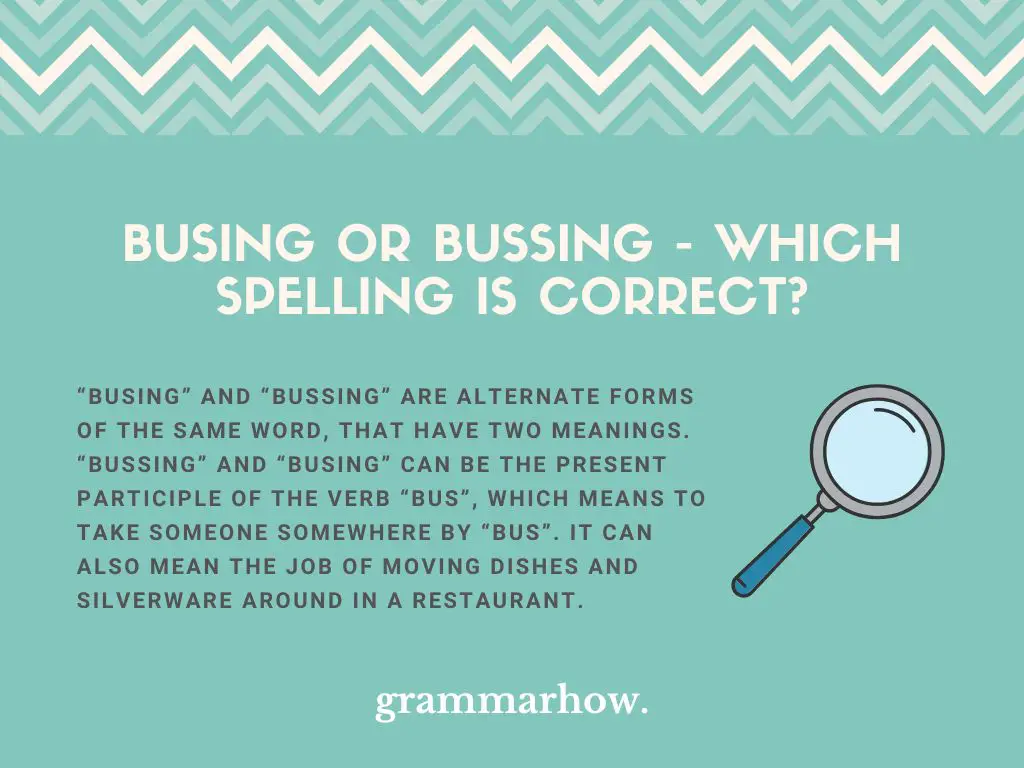Have you ever heard the words “Busing” and “Bussing” and wondered what they meant?
Let’s find out what they mean, what is the correct spelling for it, and how to properly apply those words to our vocabulary.
Busing or Bussing – Which Spelling Is Correct?
“Busing” and “Bussing” are alternate forms of the same word, that have two meanings. “Bussing” and “Busing” can be the present participle of the verb “Bus”, which means to take someone somewhere by “Bus”. It can also mean the job of moving dishes and silverware around in a restaurant.

Let’s start by taking a look at some examples:
- We’re busing people out of the area.
- We’re bussing people out of the area.
“Bussing” and “Busing”, as alternate forms, are also considered to be synonyms. Those words can interchange in a sentence, without hurting the message that’s to be conveyed.
Also, “Bussing” is slang in the US, used to indicate that something’s good.
Busing
“Busing” can be used to indicate the job of moving dishes to and from tables at a restaurant. It’s not the job of a waiter, but more like the operational job of moving things around and keeping the tables clean and ready. “Busing” can also be the present participle of the verb “Bus”, which describes the action of taking people places by bus.
Looking in The Cambridge Dictionary for the word “Busing”, the reader is forwarded to the word “Bus”. There, the definitions above are found, as follows: “to take people somewhere by bus” and “to move dishes to and from tables in a restaurant as a job”.
In the US, “Busing” (or “Bussing”) is also used as slang to indicate that something is good.
Take a look at some examples that will help clarify all of those ideas:
- The server is busing tables because part of the team called in sick today.
- Sarah works busing kids to and from school, and she loves it.
- I started working at the restaurant busing tables before I was promoted to waiter.
- Our summer break was busing!
- How long have you been busing tables at this restaurant?
Bussing
“Bussing” is an alternate form for the word “Busing”. It can also be used to indicate the job of “Bussing” tables at restaurants and taking people places by bus. Both forms are considered correct and acceptable, and you can use the one you feel more comfortable with.
The Cambridge Dictionary defines “Bussing” as the present participle of “Bus”. If the reader wants to know more they have to look at the definition of “Bus”, which we already mentioned above.
“Bussing” is common among US teenagers, and is used as slang to express that something is or was good.
- Bussing tables as a teenager was a good first job to have.
- Lina is busy bussing tables, but she’ll call you back soon.
- Peter works bussing people in and out of the plant, from the parking lot.
- I went to Flora’s barbeque yesterday and the food was bussing.
- Bussing isn’t the word I’d use to define the party last night.
Which Is Used the Most?
Which one of those forms is used more often, “Busing” or “Bussing”? Let’s take a look at the graph from Google Ngram Viewer below and find out.

This is an interesting graph. First, it shows that “Busing” is more common than “Bussing”. It’s used more often and is the preferred form in people’s speeches.
But the graph also shows that both words became relevant around 1960 – which seems to be the time when buses became very common in most places. The usage of both “Busing” and “Bussing” peaked between 1970 and 1975 and, since then, the usage has dropped considerably.
Still, both words remain relevant. We believe that’s the case because both forms are correct and acceptable. You can use either “Busing” or “Bussing” in your speeches, whatever form you feel more comfortable with.
Final Thoughts
“Busing” and “Bussing” are synonyms and can be used interchangeably. They can be the present participle of the verb “Bus”, used to describe taking people places by “Bus”. “Busing” and “Bussing” can also indicate the restaurant’s job of moving dishes around.
